formerly eScholarship Editions


|
|
|
|
Your request for similar items found 20 book(s). | Modify Search | Displaying 1 - 20 of 20 book(s) | |
| 1. | 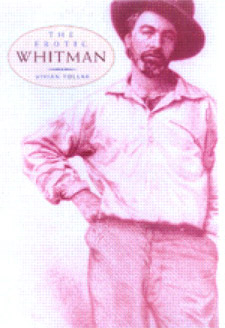 | Title: The erotic Whitman Author: Pollak, Vivian R Published: University of California Press, 2000 Subjects: Literature | American Studies | Gender Studies | American Literature | Literary Theory and Criticism Publisher's Description: In this provocative analysis of Whitman's exemplary quest for happiness, Vivian Pollak skillfully explores the intimate relationships that contributed to his portrayal of masculinity in crisis. She maintains that in representing himself as a characteristic nineteenth-century American and in proposing to heal national ills, Whitman was trying to temper his own inner conflicts as well. The poet's expansive vision of natural eroticism and of unfettered comradeship between democratic equals was, however, only part of the story. As Whitman waged a conscious campaign to challenge misogynistic and homophobic literary codes, he promoted a raceless, classless ideal of sexual democracy that theoretically equalized all varieties of desire and resisted none. Pollak suggests that this goal remains imperfectly achieved in his writings, which liberates some forbidden voices and silences others. Integrating biography and criticism, Pollak employs a loosely chronological organization to describe the poet's multifaceted "faith in sex." Drawing on his early fiction, journalism, poetry, and self-reviews, as well as letters and notebook entries, she shows how in spite of his personal ambivalence about sustained erotic intimacy, Whitman came to imagine himself as "the phallic choice of America." [brief] Similar Items |
| 2. | 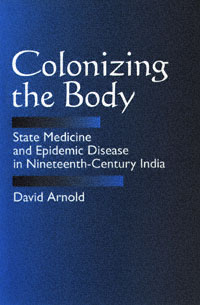 | Title: Colonizing the body: state medicine and epidemic disease in nineteenth-century India Author: Arnold, David 1946- Published: University of California Press, 1993 Subjects: Asian Studies | South Asia | Asian History | Medicine | History Publisher's Description: In this innovative analysis of medicine and disease in colonial India, David Arnold explores the vital role of the state in medical and public health activities, arguing that Western medicine became a critical battleground between the colonized and the colonizers.Focusing on three major epidemic diseases - smallpox, cholera, and plague - Arnold analyzes the impact of medical interventionism. He demonstrates that Western medicine as practiced in India was not simply transferred from West to East, but was also fashioned in response to local needs and Indian conditions.By emphasizing this colonial dimension of medicine, Arnold highlights the centrality of the body to political authority in British India and shows how medicine both influenced and articulated the intrinsic contradictions of colonial rule. [brief] Similar Items |
| 3. | 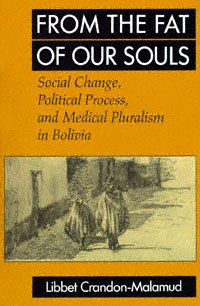 | Title: From the fat of our souls: social change, political process, and medical pluralism in Bolivia Author: Crandon-Malamud, Libbet Published: University of California Press, 1991 Subjects: Anthropology | Latin American Studies | Politics | Medical Anthropology | Medicine Publisher's Description: From the Fat of Our Souls offers a revealing new perspective on medicine, and the reasons for choosing or combining indigenous and cosmopolitan medical systems, in the Andean highlands. Closely observing the dialogue that surrounds medicine and medical care among Indians and Mestizos, Catholics and Protestants, peasants and professionals in the rural town of Kachitu, Libbet Crandon-Malamud finds that medical choice is based not on medical efficacy but on political concerns. Through the primary resource of medicine, people have access to secondary resources, the principal one being social mobility. This investigation of medical pluralism is also a history of class formation and the fluidity of both medical theory and social identity in highland Bolivia, and it is told through the often heartrending, often hilarious stories of the people who live there. [brief] Similar Items |
| 4. | 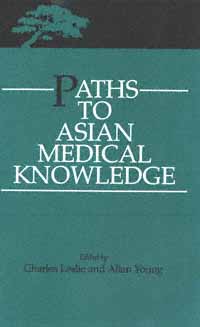 | Title: Paths to Asian medical knowledge Author: Leslie, Charles M 1923- Published: University of California Press, 1992 Subjects: Anthropology | Medical Anthropology | Asian Studies Publisher's Description: Like its classic predecessor, Asian Medical Systems , Paths to Asian Medical Knowledge significantly expands the study of Asian medicine. These essays ask how patients and practitioners know what they know - what evidence of disease or health they consider convincing and what cultural traditions and symbols guide their thinking. Whether discussing Japanese anatomy texts, Islamic humoralism, Ayurvedic clinical practice, or a variety of other subjects, the authors offer an exciting range of information and suggest new theoretical avenues for medical anthropology. [brief] Similar Items |
| 5. | 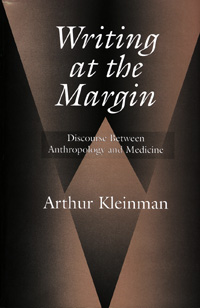 | Title: Writing at the margin: discourse between anthropology and medicine Author: Kleinman, Arthur Published: University of California Press, 1997 Subjects: Anthropology | Medical Anthropology | Sociology | Medicine | Asian Studies | Social Problems Publisher's Description: One of the most influential and creative scholars in medical anthropology takes stock of his recent intellectual odysseys in this collection of essays. Arthur Kleinman, an anthropologist and psychiatrist who has studied in Taiwan, China, and North America since 1968, draws upon his bicultural, multidisciplinary background to propose alternative strategies for thinking about how, in the postmodern world, the social and medical relate. Writing at the Margin explores the border between medical and social problems, the boundary between health and social change. Kleinman studies the body as the mediator between individual and collective experience, finding that many health problems - for example the trauma of violence or depression in the course of chronic pain - are less individual medical problems than interpersonal experiences of social suffering. He argues for an ethnographic approach to moral practice in medicine, one that embraces the infrapolitical context of illness, the responses to it, the social institutions relating to it, and the way it is configured in medical ethics.Previously published in various journals, these essays have been revised, updated, and brought together with an introduction, an essay on violence and the politics of post-traumatic stress disorder, and a new chapter that examines the contemporary ethnographic literature of medical anthropology. [brief] Similar Items |
| 6. | 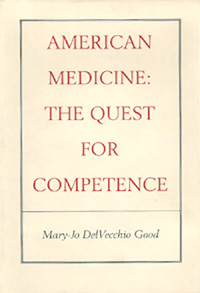 | Title: American medicine: the quest for competence Author: Good, Mary-Jo DelVecchio Published: University of California Press, 1995 Subjects: Medicine | Science | Medical Anthropology | Public Policy Publisher's Description: What does it mean to be a good doctor in America today? How do such challenges as new biotechnologies, the threat of malpractice suits, and proposed health-care reform affect physicians' ability to provide quality care?These and many other crucial questions are examined in this book, the first to fully explore the meaning and politics of competence in modern American medicine. Based on Mary-Jo DelVecchio Good's recent ethnographic studies of three distinct medical communities - physicians in rural California, academics and students involved in Harvard Medical School's innovative "New Pathway" curriculum, and oncologists working on breast cancer treatment - the book demonstrates the centrality of the issue of competence throughout the medical world. Competence, it shows, provides the framework for discussing the power struggles between rural general practitioners and specialists, organizational changes in medical education, and the clinical narratives of high-technology oncologists. In their own words, practitioners, students, and academics describe what competence means to them and reveal their frustration with medical-legal institutions, malpractice, and the limitations of peer review and medical training.Timely and provocative, this study is essential reading for medical professionals, academics, anthropologists, and sociologists, as well as health-care policymakers. [brief] Similar Items |
| 7. | 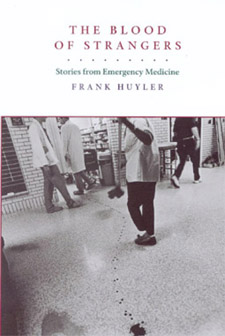 | Title: The blood of strangers: stories from emergency medicine Author: Huyler, Frank 1964- Published: University of California Press, 1999 Subjects: Medicine | American Literature | Autobiography Publisher's Description: Reminiscent of Chekhov's stories, The Blood of Strangers is a visceral portrayal of a physician's encounters with the highly charged world of an emergency room. In this collection of spare and elegant stories, Dr. Frank Huyler reveals a side of medicine where small moments - the intricacy of suturing a facial wound, the bath a patient receives from her husband and daughter - interweave with the lives and deaths of the desperately sick and injured. The author presents an array of fascinating characters, both patients and doctors - a neurosurgeon who practices witchcraft, a trauma surgeon who unexpectedly commits suicide, a wounded murderer, a man chased across the New Mexico desert by a heat-seeking missile. At times surreal, at times lyrical, at times brutal and terrifying, The Blood of Strangers is a literary work that emerges from one of the most dramatic specialties of modern medicine. This deeply affecting first book has been described by one early reader as "the best doctor collection I have seen since William Carlos Williams's The Doctor Stories ." [brief] Similar Items |
| 8. | 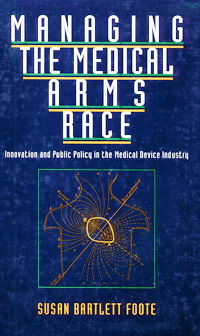 | Title: Managing the medical arms race: public policy and medical device innovation Author: Foote, Susan Bartlett Published: University of California Press, 1992 Subjects: Politics | Medicine | Public Policy | Economics and Business Publisher's Description: The allure of medical innovation is powerful - it holds out the promise of perfect health, the end of pain, the deferral of death. Our insatiable appetite for costly new technologies, fed by a profusion of innovations and the profits they generate, has led to what has been dubbed the medical arms race. During the last several decades government has been called upon to manage the escalation of this race.Foote has written the first comprehensive examination of the profound influence of government policies on medical innovation. She explains how these policies have proliferated to affect every stage of the innovative process in medical device technology - from the first research idea to the patient's bedside. Drawing on case studies of technologies as diverse as lasers, cardiac pacemakers, CT scanners, and IUDs, she traces the interaction between the industry and government institutions, including the National Institutes of Health, the FDA, and the Medicare and Medicaid programs.Public policies during the 1950s and 1960s, Foote discovers, tended to promote innovation, while the regulation and cost controls of the 1970s and 1980s began to inhibit it. For the 1990s and beyond she proposes incremental policy improvements that will rationalize and streamline government intervention. She cautions that we must recognize the limits of medical technology and public policy to cure all ills.Medical innovation is a crucial part of health care reform, a subject of increasing complexity and controversy. Written clearly and accessibly, Managing the Medical Arms Race is an invaluable source for medical, industry, and policy professionals, but it also has much to say to anybody concerned with how we as a society choose to take care of our health. [brief] Similar Items |
| 9. | 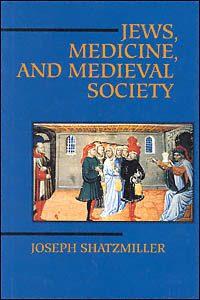 | Title: Jews, medicine, and medieval society Joseph Shatzmiller Author: Shatzmiller, Joseph Published: University of California Press, 1995 Subjects: Jewish Studies | Medieval History | European History | Medieval Studies | Medicine Publisher's Description: Jews were excluded from most professions in medieval, predominantly Christian Europe. Bigotry was widespread, yet Jews were accepted as doctors and surgeons, administering not only to other Jews but to Christians as well. Why did medieval Christians suspend their fear and suspicion of the Jews, allowing them to inspect their bodies, and even, at times, to determine their survival? What was the nature of the doctor-patient relationship? Did the law protect Jewish doctors in disputes over care and treatment?Joseph Shatzmiller explores these and other intriguing questions in the first full social history of the medieval Jewish doctor. Based on extensive archival research in Provence, Spain, and Italy, and a deep reading of the widely scattered literature, Shatzmiller examines the social and economic forces that allowed Jewish medical professionals to survive and thrive in thirteenth- and fourteenth-century Europe. His insights will prove fascinating to scholars and students of Judaica, medieval history, and the history of medicine. [brief] Similar Items |
| 10. | 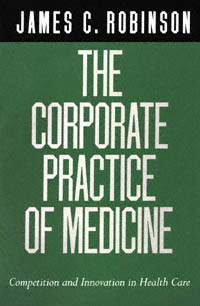 | Title: The corporate practice of medicine: competition and innovation in health care Author: Robinson, James C 1953- Published: University of California Press, 1999 Subjects: Politics | Public Policy | Medicine | Economics and Business Publisher's Description: One of the country's leading health economists presents a provocative analysis of the transformation of American medicine from a system of professional dominance to an industry under corporate control. James Robinson examines the economic and political forces that have eroded the traditional medical system of solo practice and fee-for-service insurance, hindered governmental regulation, and invited the market competition and organizational innovations that now are under way. The trend toward health care corporatization is irreversible, he says, and it parallels analogous trends toward privatization in the world economy.The physician is the key figure in health care, and how physicians are organized is central to the health care system, says Robinson. He focuses on four forms of physician organization to illustrate how external pressures have led to health care innovations: multispecialty medical groups, Independent Practice Associations (IPAs), physician practice management firms, and physician-hospital organizations. These physician organizations have evolved in the past two decades by adopting from the larger corporate sector similar forms of ownership, governance, finance, compensation, and marketing.In applying economic principles to the maelstrom of health care, Robinson highlights the similarities between competition and consolidation in medicine and in other sectors of the economy. He points to hidden costs in fee-for-service medicine - overtreatment, rampant inflation, uncritical professional dominance regarding treatment decisions - factors often overlooked when newer organizational models are criticized.Not everyone will share Robinson's appreciation for market competition and corporate organization in American health care, but he challenges those who would return to the inefficient and inequitable era of medicine from which we've just emerged. Forcefully written and thoroughly documented, The Corporate Practice of Medicine presents a thoughtful - and optimistic - view of a future health care system, one in which physician entrepreneurship is a dynamic component. [brief] Similar Items |
| 11. | 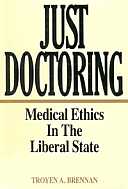 | Title: Just doctoring: medical ethics in the liberal state Author: Brennan, Troyen A Published: University of California Press, 1991 Subjects: Philosophy | Ethics | Medicine Publisher's Description: Just Doctoring draws the doctor-patient relationship out of the consulting room and into the middle of the legal and political arenas where it more and more frequently appears. Traditionally, medical ethics has focused on the isolated relationship of physician to patient in a setting that has left the physician virtually untouched by market constraints or government regulation. Arguing that changes in health care institutions and legal attention to patient rights have made conventional approaches obsolete, Troyen Brennan points the way to a new, more aware and engaged medical ethics.The medical profession is no longer isolated, even theoretically, from the liberal, market-dominated state. Old ideas of physician beneficence and altruism must make way for a justice-based medical ethics, assuming a relationship between equals more compatible with liberal political philosophy. Brennan offers clinical examples of many of today's most challenging medical problems - from informed consent to care rationing and the repercussions of the HIV epidemic - and gives his recommendation for a new ethical perspective. This lively and controversial plea for a rethinking of medical ethics goes right to the heart of medical care at the end of the twentieth century. [brief] Similar Items |
| 12. | 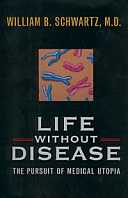 | Title: Life without disease: the pursuit of medical utopia Author: Schwartz, William B 1922- Published: University of California Press, 1998 Subjects: Science | Medicine | Economics and Business | History and Philosophy of Science | Public Policy Publisher's Description: The chaotic state of today's health care is the result of an explosion of effective medical technologies. Rising costs will continue to trouble U.S. health care in the coming decades, but new molecular strategies may eventually contain costs. As life expectancy is dramatically extended by molecular medicine, a growing population of the aged will bring new problems. In the next fifty years genetic intervention will shift the focus of medicine in the United States from repairing the ravages of disease to preventing the onset of disease. Understanding the role of genes in human health, says Dr. William B. Schwartz, is the driving force that will change the direction of medical care, and the age-old dream of life without disease may come close to realization by the middle of the next century. Medical care in 2050 will be vastly more effective, Schwartz maintains, and it may also be less expensive than the resource-intensive procedures such as coronary bypass surgery that medicine relies on today.Schwartz's alluring prospect of a medical utopia raises urgent questions, however. What are the scientific and public policy obstacles that must be overcome if such a goal is to become a reality? Restrictions on access imposed by managed care plans, the corporatization of charitable health care institutions, the increasing numbers of citizens without health insurance, the problems with malpractice insurance, and the threatened Medicare bankruptcy - all are the legacy of medicine's great progress in mastering the human body and society's inability to assimilate that mastery into existing economic, ethical, and legal structures. And if the average American life span is 130 years, a genuine possibility by 2050, what social and economic problems will result?Schwartz examines the forces that have brought us to the current health care state and shows how those same forces will exert themselves in the decades ahead. Focusing on the inextricable link between scientific progress and health policy, he encourages a careful examination of these two forces in order to determine the kind of medical utopia that awaits us. The decisions we make will affect not only our own care, but also the system of care we bequeath to our children. [brief] Similar Items |
| 13. | 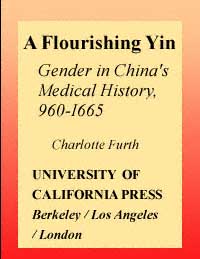 | Title: A flourishing Yin: gender in China's medical history, 960-1665 Author: Furth, Charlotte Published: University of California Press, 1999 Subjects: History | Asian History | Asian Studies | Women's Studies | China | Medicine Publisher's Description: This book brings the study of gender to Chinese medicine and in so doing contextualizes Chinese medicine in history. It examines the rich but neglected tradition of fuke , or medicine for women, over the seven hundred years between the Song and the end of the Ming dynasty. Using medical classics, popular handbooks, case histories, and belles lettres , it explores evolving understandings of fertility and menstruation, gestation and childbirth, sexuality, and gynecological disorders.Furth locates medical practice in the home, where knowledge was not the monopoly of the learned physician and male doctors had to negotiate the class and gender boundaries of everyday life. Women as healers and as patients both participated in the dominant medical culture and sheltered a female sphere of expertise centered on, but not limited to, gestation and birth. Ultimately, her analysis of the relationship of language, text, and practice reaches beyond her immediate subject to address theoretical problems that arise when we look at the epistemological foundations of our knowledge of the body and its history. [brief] Similar Items |
| 14. |  | Title: Taming the wind of desire: psychology, medicine, and aesthetics in Malay shamanistic performance Author: Laderman, Carol Published: University of California Press, 1991 Subjects: Anthropology | Asian Studies | Medical Anthropology | Psychology | Southeast Asia | Medicine Publisher's Description: Charged with restoring harmony and relieving pain, the Malay shaman places his patients in trance and encourages them to express their talents, drives, personality traits - the "Inner Winds" of Malay medical lore - in a kind of performance. These healing ceremonies, formerly viewed by Western anthropologists as exotic curiosities, actually reveal complex multicultural origins and a unique indigenous medical tradition whose psychological content is remarkably relevant to contemporary Western concerns.Accepted as apprentice to a Malay shaman, Carol Laderman learned and recorded every aspect of the healing seance and found it comparable in many ways to the traditional dramas of Southeast Asia and of other cultures such as ancient Greece, Japan, and India. The Malay seance is a total performance, complete with audience, stage, props, plot, music, and dance. The players include the patient along with the shaman and his troupe. At the center of the drama are pivotal relationships - among people, between humans and spirits, and within the self. The best of the Malay shamans are superb poets, dramatists, and performers as well as effective healers of body and soul. [brief] Similar Items |
| 15. | 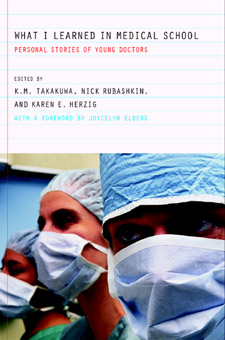 | Title: What I learned in medical school: personal stories of young doctors Author: Takakuwa, Kevin M Published: University of California Press, 2004 Subjects: Medicine | Sociology | Ethnic Studies | Gender Studies | Anthropology | Health Care Publisher's Description: Like many an exclusive club, the medical profession subjects its prospective members to rigorous indoctrination: medical students are overloaded with work, deprived of sleep and normal human contact, drilled and tested and scheduled down to the last minute. Difficult as the regimen may be, for those who don't fit the traditional mold - white, male, middle-to-upper class, and heterosexual - medical school can be that much more harrowing. This riveting book tells the tales of a new generation of medical students - students whose varied backgrounds are far from traditional. Their stories will forever alter the way we see tomorrow's doctors. In these pages, a black teenage mother overcomes seemingly insurmountable odds, an observant Muslim dons the hijab during training, an alcoholic hides her addiction. We hear the stories of an Asian refugee, a Mexican immigrant, a closeted Christian, an oversized woman - these once unlikely students are among those who describe their medical school experiences with uncommon candor, giving a close-up look at the inflexible curriculum, the pervasive competitive culture, and the daunting obstacles that come with being "different" in medical school. Their tales of courage are by turns poignant, amusing, eye-opening - and altogether unforgettable. [brief] Similar Items |
| 16. | 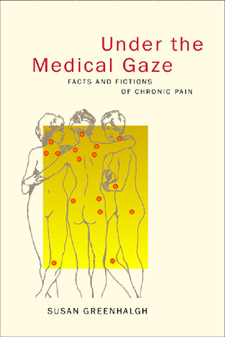 | Title: Under the medical gaze: facts and fictions of chronic pain Author: Greenhalgh, Susan Published: University of California Press, 2001 Subjects: Anthropology | Folklore and Mythology | Medical Anthropology | Physical Anthropology | Cultural Anthropology | Medicine | Gender Studies | Sociology | Social Problems | Social Problems Publisher's Description: This compelling account of the author's experience with a chronic pain disorder and subsequent interaction with the American health care system goes to the heart of the workings of power and culture in the biomedical domain. It is a medical whodunit full of mysterious misdiagnosis, subtle power plays, and shrewd detective work. Setting a new standard for the practice of autoethnography, Susan Greenhalgh presents a case study of her intense encounter with an enthusiastic young specialist who, through creative interpretation of the diagnostic criteria for a newly emerging chronic disease, became convinced she had a painful, essentially untreatable, lifelong muscle condition called fibromyalgia. Greenhalgh traces the ruinous effects of this diagnosis on her inner world, bodily health, and overall well-being. Under the Medical Gaze serves as a powerful illustration of medicine's power to create and inflict suffering, to define disease and the self, and to manage relationships and lives. Greenhalgh ultimately learns that she had been misdiagnosed and begins the long process of undoing the physical and emotional damage brought about by her nearly catastrophic treatment. In considering how things could go so awry, she embarks on a cogent and powerful analysis of the sociopolitical sources of pain through feminist, cultural, and political understandings of the nature of medical discourse and practice in the United States. She develops fresh arguments about the power of medicine to medicalize our selves and lives, the seductions of medical science, and the deep, psychologically rooted difficulties women patients face in interactions with male physicians. In the end, Under the Medical Gaze goes beyond the critique of biomedicine to probe the social roots of chronic pain and therapeutic alternatives that rely on neither the body-cure of conventional medicine nor the mind-cure of some alternative medicines, but rather a broader set of strategies that address the sociopolitical sources of pain. [brief] Similar Items |
| 17. |  | Title: Touching liberty: abolition, feminism, and the politics of the body Author: Sánchez-Eppler, Karen Published: University of California Press, 1993 Subjects: Literature | Literary Theory and Criticism | Women's Studies | United States History | American Studies Publisher's Description: In this striking study of the pre-Civil War literary imagination, Karen Sánchez-Eppler charts how bodily difference came to be recognized as a central problem for both political and literary expression. Her readings of sentimental anti-slavery fiction, slave narratives, and the lyric poetry of Walt Whitman and Emily Dickinson demonstrate how these texts participated in producing a new model of personhood, one in which the racially distinct and physically constrained slave body converged with the sexually distinct and domestically circumscribed female body.Moving from the public domain of abolitionist politics to the privacy of lyric poetry, Sánchez-Eppler argues that attention to the physical body blurs the boundaries between public and private. Drawing analogies between black and female bodies, feminist-abolitionists use the public sphere of anti-slavery politics to write about sexual desires and anxieties they cannot voice directly.Sánchez-Eppler warns against exaggerating the positive links between literature and politics, however. She finds that the relationships between feminism and abolitionism reveal patterns of exploitation, appropriation, and displacement of the black body that acknowledge the difficulties in embracing "difference," in the nineteenth century as in the twentieth. Her insightful examination of issues that continue to be relevant today will make a distinctive mark on American literary and cultural studies. [brief] Similar Items |
| 18. | 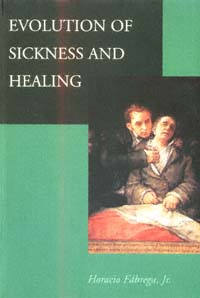 | Title: Evolution of sickness and healing Author: Fabrega, Horacio Published: University of California Press, 1997 Subjects: Medicine | Medical Anthropology Publisher's Description: Evolution of Sickness and Healing is a theoretical work on the grand scale, an original synthesis of many disciplines in social studies of medicine. Looking at human sickness and healing through the lens of evolutionary theory, Horacio Fàbrega, Jr. presents not only the vulnerability to disease and injury but also the need to show and communicate sickness and to seek and provide healing as innate biological traits grounded in evolution. This linking of sickness and healing, as inseparable facets of a unique human adaptation developed during the evolution of the hominid line, offers a new vantage point from which to examine the institution of medicine.To show how this complex, integrated adaptation for sickness and healing lies at the root of medicine, and how it is expressed culturally in relation to the changing historical contingencies of human societies, Fàbrega traces the characteristics of sickness and healing through the early and later stages of social evolution. Besides offering a new conceptual structure and a methodology for analyzing medicine in evolutionary terms, he shows the relevance of this approach and its implications for the social sciences and for medical policy. Health scientists and medical practitioners, along with medical historians, economists, anthropologists, and sociologists, now have the opportunity to consider every essential aspect of medicine within an integrated framework. [brief] Similar Items |
| 19. | 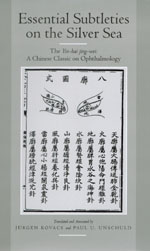 | Title: Essential subtleties on the silver sea: the Yin-hai jing-wei: a Chinese classic on ophthalmology Author: Sun, Simiao 581-682 Published: University of California Press, 1999 Subjects: Anthropology | Medical Anthropology | China | History and Philosophy of Science Publisher's Description: Here is the first translation into English of the complete Yin-Hai Jing-Wei , a classic fifteenth-century text on Chinese ophthalmology. As one of the few original manuscripts on traditional Chinese medicine translated into a Western language, this work offers an unprecedented view of the practice of medicine, and specifically eye care, in premodern China. Superbly rendered from the classical Chinese and extensively annotated by Paul U. Unschuld and Jürgen Kovacs, the text provides detailed descriptions of the etiology, symptomatology, and therapy of every eye disease known to fifteenth-century Chinese practitioners. The translators' introduction also provides the first in-depth analysis of the development of this specialty within Chinese medicine. As a source for comparative studies of Chinese and Western medicine and numerous other issues in the history of medicine and Chinese thought, the Yin-Hai Jing-Wei has no equal in the Western world. [brief] Similar Items |
| 20. | 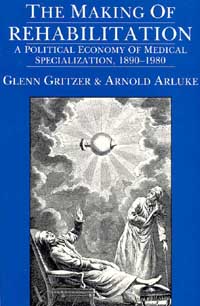 | Title: The making of rehabilitation: a political economy of medical specialization, 1890-1980 Author: Gritzer, Glenn Published: University of California Press, 1989 Subjects: Anthropology | Cultural Anthropology Publisher's Description: Focusing on the history of one medical field - rehabilitation medicine - this book provides the first systematic analysis of the underlying forces that shape medical specialization, challenging traditional explanations of occupational specialization. Similar Items |